Washington, D.C.
The Pew Forum invited former presidential speechwriter Michael Gerson to discuss his new book, Heroic Conservatism, with Forum senior advisors Michael Cromartie and E.J. Dionne Jr. and a select group of journalists. Gerson was challenged to define “heroic conservatism” and critique the Bush administration’s record on implementing the “compassionate conservative” philosophy Gerson himself helped to craft. Offering criticism and praise to both parties, Gerson lamented the lack of Republican support for domestic social justice issues, while calling on all Americans, in spite of the difficulties in Iraq, not to give up on a “moral internationalism.”
Speaker: Michael Gerson, Roger Hertog Senior Fellow, Council on Foreign Relations
Moderators: Michael Cromartie, Vice President, Ethics & Public Policy Center; Senior Advisor, Pew Forum on Religion & Public Life
E.J. Dionne Jr., Senior Fellow, The Brookings Institution; Columnist, The Washington Post; Senior Advisor, Pew Forum on Religion & Public Life
Use the video icons (

) to access the video clips from the written transcript.

Listen to the audio transcript
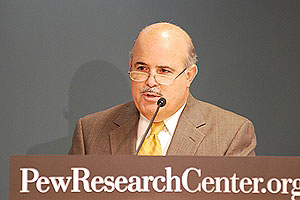
LUIS LUGO: Good afternoon and welcome. I’m Luis Lugo, director of the Pew Forum on Religion & Public Life, which is a project of the Pew Research Center. The center is a nonpartisan organization and does not take positions on policy debates. We’re delighted to have as our special guest today Michael Gerson, who will discuss his new book, Heroic Conservatism: Why Republicans Need to Embrace America’s Ideals (And Why They Deserve to Fail if They Don’t).
This event is part of an ongoing series bringing together journalists and policy leaders to discuss timely topics at the intersection of religion and public affairs. The format for today, as you have noticed, is different from our regular press luncheons. We’ve been going through our own conversion here at the Forum. It’s driven by my staff’s ongoing proselytizing efforts, directed at techno-peasants like myself. On behalf of the gospel of new web technology, they have succeeded.

Related Pew Forum Articles
Event: Religion, Rhetoric, and the Presidency: A Conversation with Michael Gerson
Event: Lifting Up the Poor: A Dialogue on Religion, Poverty and Welfare Reform
Event: Is the Market Moral? A Dialogue on Religion, Economics & Justice
Bookmark this article
More: Research, news, blogs
[My staff]
Both are senior advisors to the Pew Forum and together they will help guide the conversation. Again, many thanks for coming and being part of our experiment.
MICHAEL CROMARTIE: Thank you, Luis. It’s my privilege to introduce Michael Gerson. He is currently the Roger Hertog senior fellow at the Council on Foreign Relations here in Washington, D.C. His work at the council focuses on global health and development, religion and foreign policy, and the democracy agenda.
[as well as]
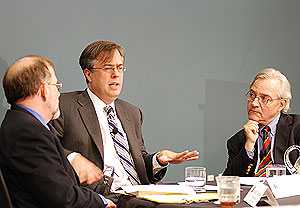
He joined the Bush presidential campaign in the spring of 1999 as the chief speechwriter for then-candidate Bush. Before that, he was previously a senior editor covering politics for U.S. News & World Report. He was a speechwriter and a policy advisor before that to Jack Kemp and then to Senator Bob Dole and his 1996 campaign. Before that, he served as a policy director for Senator Dan Coats. We’re delighted to have Michael Gerson here today at the Pew Forum to celebrate his new book, Heroic Conservatism. The first question for Michael Gerson will come from my colleague, E.J. Dionne.
E.J. DIONNE: Thank you. It’s good to be here. Both Mikes are to my right, and I’m honored to be with them. Let me ask the most basic question. How is “heroic conservatism” different from all other kinds of conservatism? How is it different from neo-conservatism, paleo-conservatism, or just plain conservatism? What makes it distinctive?
MICHAEL GERSON: Before I get to that, I want to thank the Pew Forum for this opportunity. I’ll always remember that immediately after I did my first Pew event down in Florida, I had a heart attack.
CROMARTIE: We like to think you survived and prospered after the heart attack.
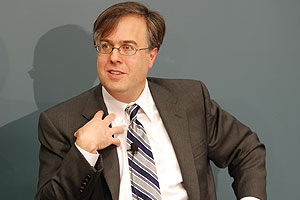
GERSON: It may have been the journalists’ questions, or it may have been the fact that we were on a topless beach, I think-(laughter)-that’s true, right off the hotel. Let me answer that question in a couple of ways.
[a]

Video Highlight http://blip.tv/scripts/flash/showplayer.swf?enablejs=true&feedurl=http:%2F%2Fpewforum%2Eblip%2Etv%2Frss%2F&file=http:%2F%2Fblip%2Etv%2Frss%2Fflash%2F500346&showfsbutton=false&brandlink=http:%2F%2Fpewforum%2Eorg&brandname=Pew%20Forum&showguidebutton=false&showfsbutton=true&showplayerpath=http:%2F%2Fblip%2Etv%2Fscripts%2Fflash%2Fshowplayer%2Eswf ‘Heroic Conservatism’ (02:03) Watch more event video on the multimedia page
[also]

Video Highlight http://blip.tv/scripts/flash/showplayer.swf?enablejs=true&feedurl=http:%2F%2Fpewforum%2Eblip%2Etv%2Frss%2F&file=http:%2F%2Fblip%2Etv%2Frss%2Fflash%2F500351&showfsbutton=false&brandlink=http:%2F%2Fpewforum%2Eorg&brandname=Pew%20Forum&showguidebutton=false&showfsbutton=true&showplayerpath=http:%2F%2Fblip%2Etv%2Fscripts%2Fflash%2Fshowplayer%2Eswf ‘Moral Internationalism’ (00:56) Watch more event video on the multimedia page
[moral]
[seriously]
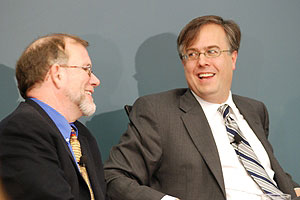
CROMARTIE: I know E.J. has a follow-up, but before that, I have a follow up, Michael, quickly, if I could. You were recently on The Daily Show with Jon Stewart. I’m going to ask the question he asked you. What you just described is the Democratic Party.
GERSON: (Chuckles.)
CROMARTIE: And your reaction to that is what?
GERSON: If your question assumes that goals of social justice are Democratic goals, then that would be true. But I don’t make that assumption.
CROMARTIE: Many people do though.
GERSON: I think those are shared social goals, but it does point out a cleavage. I believe that bureaucratic centralization and arrogant government have not achieved those goals very well. For welfare reform, for a variety of measures on crime-these are essentially the application of conservative ideas to achieve what are traditionally seen as liberal ends. So I guess I would reject that. But it does expose a cleavage. There are certain types of conservatism that argue that the definition of justice is the impartial application of rules, period, meaning the rule of law and markets. And that if everyone has an equal chance and the rules are correctly enforced, then you’ve achieved social justice.
[for]
CROMARTIE: By the way, if I could just say as a fellow Protestant, there is such a thing as Protestant social thought, you would agree. You keep talking about Catholic social thought.
[Abraham]
It’s left me believing that it’s possible, and arguing that it’s possible, to be a supporter of free markets and also believe in helping African kids-(inaudible)-to be a social conservative, which I am, and to believe in confronting these durable problems of race and poverty in this country that I think neither party has been particularly responsible on. So, yes, there are Protestant traditions, but the predominant one in our time has been a Catholic tradition.
DIONNE: Just so everyone knows, we’re not going to monopolize this; we want to open it up, but there are a few questions we want to ask. I also have some from the bloggers. I may combine a number of the questions I wanted to ask you.
I once told you, Mike, that if President Bush actually acted on all of the Catholic social thought you put in his speeches, I might have to vote for him. But, fortunately, perhaps, I never had this problem.
CROMARTIE: Otherwise, you’d have a heart attack.

Video Highlight http://blip.tv/scripts/flash/showplayer.swf?enablejs=true&feedurl=http:%2F%2Fpewforum%2Eblip%2Etv%2Frss%2F&file=http:%2F%2Fblip%2Etv%2Frss%2Fflash%2F500353&showfsbutton=false&brandlink=http:%2F%2Fpewforum%2Eorg&brandname=Pew%20Forum&showguidebutton=false&showfsbutton=true&showplayerpath=http:%2F%2Fblip%2Etv%2Fscripts%2Fflash%2Fshowplayer%2Eswf Critiquing Tax Cuts (02:58) Watch more event video on the multimedia page
[between]
[the]
DIONNE: But you had the choice of putting it in your own bill. They could have thrown it out if they wanted.

GERSON: Well, but you negotiate these things, even what you put in your own bill, as you go into the process. That’s the reality. John DiIulio and a lot of other people pushed hard up on the Hill to try to gain some interest in these ideas, and you had almost monolithic indifference on these questions. So that’s the reality; on domestic policy, a president is constrained by the Congress.
Should the administration have pushed more? You could probably make a case that the legislative shop accepted that consensus rather than challenged it, and that there might have been more emphasis on it. But the reality there is the president eventually turned to a series of executive orders to try to do what he could, because that’s the power that he had, to open up contracting in the departments and to make sure there is fair treatment for faith-based institutions in the provision of social services. So it ended up being a mixed record.
There was very little action- particularly early on-on those issues that required congressional approval because there was almost no constituency for these ideas; it’s a shame and a problem. The Republican Party had accepted George Bush, but had not been transformed by that ideology. We found tremendous obstacles when we got there.
But in foreign policy, in a certain way, the president has a much freer hand for good and ill on these things. That’s an area where I saw, eventually, a lot of compassionate conservatism in action. The president, through his own interest, pushed for a $15 billion AIDS program in Africa, the largest initiative on a single disease in human history, pushed for the President’s Malaria Initiative, and, I think, did what he could on the faith-based initiative, given the constraints of an unwilling Congress. So I view that more as a mixed situation.
In the aftermath of the Bush administration, one of the good things is that-I have the figure in the book-more than 40 states now have faith-based offices, Democratic and Republican, where they are trying to find ways to strengthen community and faith-based institutions to confront problems on a state level. Many of the departments now have it, and I think there’s been real progress in making sure there is equal treatment, that religious institutions have not been discriminated against. But certainly I’m frustrated on that front, about what the Congress was willing to do and then how the administration reacted to that, in not being as vigorous as it could have been in challenging that indifference.
DIONNE: The other question, but I won’t press you on it now, is where the administration chose to put resources. There was a great debate over whether, in fact, even the faith-based groups ended up with more money at the end of this process. I know those numbers are argued about, but the administration’s priorities were not clearly in the direction of the least and the poorest among us.
[when]
CROMARTIE: How much, Michael, did 9/11 have an influence on the faith-based initiatives?
[who]
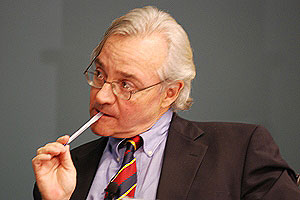
DIONNE: I’m going to ask my last question for this round so we can go out there. I would like you to talk about Iraq, which plays an important role in your book. Your “heroic conservatism” title, I think, is also linked to your sense of the United States’ obligation to push democracy in the world. I think many people believe that, but worry that this particular Iraq policy may have discredited that idea. You are critical, in certain respects, of the Iraq policy pursued by the administration. In particular, I would ask, how heroic was it to wage a war without asking people to pay for it, to have optimistic assumptions going in, and the whole question of whether enough troops were sent there in the first place. I could go on, but I won’t-could you just-(inaudible, cross talk).
GERSON: I’m happy to go on, actually.
DIONNE: Could you just talk about your own take on where Iraq leaves us?
GERSON: It’s one of the serious concerns of the book. Because of serious problems and mistakes in Iraq policy, you could get a serious backlash against the moral internationalism I argue for. I think that would be a disaster for American policy in a lot of ways that I argue about, but it’s also understandable in the context of Iraq.
One of the nice things about writing a book is it gives you a chance to put your own thoughts together. When you experience events it’s hard to interpret them. But there were at least three theories of the Iraq war. The first one was, “Just liberate and leave.” There was an assumption that our military would be down to 30 or 40,000 troops by the end of the year, and that proved to be an unrealistic assumption. It was an assumption that you could take off the top of the pyramid of Iraqi society and other institutions would remain in place, and that it would be possible to have a quick transition. That turned out not to be true.
[we were]
[This]
[can’t]
[are]
[in]
CROMARTIE: Michael, you have a chapter in the book called, “Has the War in Iraq Killed Idealism?”
[killed idealism]
CROMARTIE: By the way, did the president get a lot of criticism from the right for that money?
GERSON: At the time, the financial situation was a little better. (Laughter.)
UNIDENTIFIED: The dollar went farther. (Laughter.)
GERSON: But that is a case where he has gotten policy criticism from left and right, on trying to export the culture war to Africa.
CROMARTIE: Now, why would the left be upset about $15 billion going to Africa?
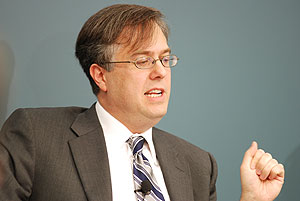
[actually]
So we have had those arguments, but actually not too many arguments, about total level of spending. There is one story I tell in the book in the aftermath of Katrina where someone from one of the conservative Washington think tanks argued that the president needs to give up something he wants, why not the AIDS program, in order to pay for Katrina.
CROMARTIE: You’re going to name names?
GERSON: No, I wouldn’t, but it’s the kind of case where skepticism of government, which is a conservative trait, can be a brutal indifference to the consequences of reductions in government. I think that needs to be confronted too, even though there is not much pushback on those issues in the Republican Party right now.

Video Highlight http://blip.tv/scripts/flash/showplayer.swf?enablejs=true&feedurl=http:%2F%2Fpewforum%2Eblip%2Etv%2Frss%2F&file=http:%2F%2Fblip%2Etv%2Frss%2Fflash%2F500344&showfsbutton=false&brandlink=http:%2F%2Fpewforum%2Eorg&brandname=Pew%20Forum&showguidebutton=false&showfsbutton=true&showplayerpath=http:%2F%2Fblip%2Etv%2Fscripts%2Fflash%2Fshowplayer%2Eswf Do Conservatives Get It? (03:05) Watch more event video on the multimedia page
[*]
DIONNE: And as Terry says, “Real names, and then defend the choices.” (Laughter.)
GERSON: Well, let’s see if we can get to five; I’m not sure.
CROMARTIE: He asked for five, and I edited it to say “several.” I think they are all blurbing the back of your book.
[had a]
I look at somebody like Rick Warren, who represents a very different model of social engagement on a variety of issues-
CROMARTIE: Among conservative Protestants.
[James]
I’ll tell you-
CROMARTIE: We have two behind him. We’re keeping track; that’s two.
GERSON: (Inaudible, cross talk.)
CROMARTIE: I just want to say about Governor Huckabee: His campaign was not doing very well until we had him here for lunch at the Forum. (Laughter.)
DIONNE: Right, and he didn’t have a heart attack.
CROMARTIE: It sort of took off right after that lunch.
GERSON:Sam Brownback, who has dropped out of the race, is the leader of many of these ideas on Capitol Hill, the leader on malaria issues in Africa, the leader on human trafficking. He certainly represents-He wrote an article in the Post the other day essentially calling for his version of a consistent ethic of life, which sounds very much like Cardinal Bernardin. I think you see that influence. I’ll tell you something strange, when I talk with young evangelicals-
CROMARTIE: These are not the people at the top of the pack right now, though, is it?
GERSON: Well, no, and I wouldn’t put Giuliani in this category or some others. But I would mention, when I talk with young evangelicals, students at Wheaton College, where I just was, or Harvard, where I just spent some time up at the Kennedy School, and you ask them, “Who is your model of social engagement, who do you really-(inaudible) -beliefs?” And they almost uniformly say, “Bono.” And that to me is-
DIONNE: He can’t run for president.
GERSON: Yeah, exactly; he’s a foreigner. But it is an interesting sign of a shift, that a lot of young evangelicals want to be proud of their political engagement; they want it to be broader than the tradition that that has come before, and Bono actually plays an important role, as African issues play an important mobilizing role on a lot of these things. What does that mean? Is there a constituency for these things? I think it’s more of a tendency than a movement right now. There are not a whole lot of institutions that represent this kind of thought. It’s certainly not traditional conservative institutions. But I think there is a kind of market or a hunger for a politics fairly broadly in America that is oriented not just primarily toward people’s interests or their resentments but toward their aspirations. At least I hope that is true.
DIONNE: It should be said for the record that Mike went to Wheaton, which regards Harvard as the Wheaton of the Ivy League. (Laughter.) A fine school.
JANE MAYER, THE NEW YORKER: I wonder how you reconcile the vision of what you describe as “a religiously informed vision of human rights and dignity” with the record of the Bush administration on treatment of suspects in the war on terror, where you might place them outside the reach of the Geneva Conventions and visits from the Red Cross and in unlimited detention and even maybe water board them or whatever else they have been doing that we don’t really know all of the details of. Does that comport with that vision that you have got, and if not, was it an area of tension for you within the administration?
[and]
I think Abu Ghraib played an extraordinary role in confirming the world’s worst suspicions even when they were completely unjustified. That is the role of symbols in politics, and it was a terrible failure.
[where]
[that]
DIONNE: Does this mean you are sympathetic to some of Jack Goldsmith’s critiques? It sounds a little like him.
[suspects]
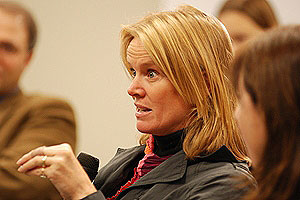
KATTY KAY, BBC: Am I allowed a two-part question? I know the president loves-(inaudible)-
CROMARTIE: You are allowed a two party.
DIONNE: He is more compassionate.
KAY: You mentioned the second inaugural. I have to say, this week, watching the pictures in Pakistan, I keep thinking of the second inaugural. I remember listening to the second inaugural, thinking, “I can see how this plays in America, and I can see that many people around the world are going to hate this address.” Part of the reason they hate it is because they look at somewhere like Pakistan, and there is an inevitable accusation of hypocrisy.
GERSON: Of course.
KAY: How does your vision of American foreign policy deal with the realities of somewhere like Pakistan?

Video Highlight http://blip.tv/scripts/flash/showplayer.swf?enablejs=true&feedurl=http:%2F%2Fpewforum%2Eblip%2Etv%2Frss%2F&file=http:%2F%2Fblip%2Etv%2Frss%2Fflash%2F500350&showfsbutton=false&brandlink=http:%2F%2Fpewforum%2Eorg&brandname=Pew%20Forum&showguidebutton=false&showfsbutton=true&showplayerpath=http:%2F%2Fblip%2Etv%2Fscripts%2Fflash%2Fshowplayer%2Eswf The Pakistan Question (02:28) Watch more event video on the multimedia page
GERSON: I actually try to deal with it in the book because an idealistic American foreign policy is always going to have elements of hypocrisy in a certain way. The reality is, after 9/11, we were not going to pursue immediate elections in Saudi Arabia, which would have resulted in a worse outcome. There is a cost to immediate and destabilizing social change in a lot of these questions. But of course, this has been a traditional criticism of idealistic American foreign policy. Lincoln was not an immediate abolitionist, and America in the Cold War, even at its most idealistic, had to make deals with a variety of interests in the cause of stability.
My concern is when you abandon the goals, and you try not to move toward them. Pakistan is a very difficult case. In the aftermath of the emergency decree, the administration is faced with a choice. You will either encourage the army to overthrow Musharraf, or you try to get him back on track to move in a democratic direction, and they chose the second option as being less destabilizing. It’s hard to argue with. The real question there is whether they should have pushed harder earlier, for the last couple of years, on a variety of issues using the leverage of aid and other things: madrasas and Al-Qaeda and a lot of other issues. I think you can probably make that argument.
[to them,]
The Cold War is the example. I think our idealism was essential to the outcome. I think that dissidents in the gulag knew that Ronald Reagan was on their side. But that didn’t mean he had to engage in immediate, radical and destabilizing confrontation in order to achieve those goals. With a lot of countries it’s possible to have a mature, two-track relationship.
[and]
[president’s]
CROMARTIE: Against meeting.
[The news]
CROMARTIE: Are there dissidents he can meet with now from Pakistan?
GERSON: I think it would be a good idea; bring them in.
[saying,]
GERSON: I’ve seldom gotten that accusation actually-it’s more the other side, given the fact I’m at the Council on Foreign Relations, and there’s some significant criticism of-
DIONNE: The illuminati.
GERSON: No, of idealistic language in foreign affairs. But I guess that’s a case where the best foreign policy-and I think Reagan foreign policy, I think Kennedy foreign policy, I think Truman foreign policy, I think Roosevelt foreign policy-was idealistic about ends and realistic about means. You can’t be anything else when you’re president of the United States, and you’re pursuing the defense of the Constitution and the protection of the American people. Sometimes, that requires, as you said, difficult choices.
But I guess what we were asserting, and you see it explicitly in the second inaugural, is that American interests-Let me put it this way: Particularly in the Middle East, but also in other unstable parts of the world, the status quo is not sustainable; it is actively producing people and ideologies that kill our citizens and will do so in greater numbers as their technology increases.
That is a fairly radical foreign policy insight, that what we see, particularly in the Arab Middle East, but also in other places, is not stable or sustainable. It is, in fact, increasingly unbalanced and dangerous. And if we don’t do something about it, by helping insofar as we can, because our levers are limited, but by encouraging the kind of social change that results in more hopeful societies, there are going to be terrible results in the future. That’s a pretty strong claim.
CROMARTIE: Michael, the president and the secretary of state are getting hammered on that very point. So what is your counsel to them? Be patient?
GERSON: My counsel to them, as I write in the book, is that they ought to take-I am, for example, disappointed on Egypt policy. I think there is a cost to America right now in Egypt, not for being too idealistic, but for actually being inconsistent with our own ideals.
CROMARTIE: Inconsistent with our own ideals.
GERSON: Yeah, and I think that there are a number of dissidents and reformers that we have actually encouraged over the years-
CROMARTIE: In Egypt.
GERSON: -in Egypt, who now feel pretty disillusioned with American policy. I’m perfectly willing to make those criticisms, because when America was more consistently applying these ideals, we had some extraordinary things happen in the year 2005, which wasn’t that long ago. People talk about the Arab spring, and there were changes in the former Soviet Union, dramatic changes, significant amounts of progress.
UNIDENTIFIED: Temporary.
GERSON: Yeah, but not all of it temporary. I think it’s an indication that you can get some results when you emphasize these ideals.
KAY: I’ve still got the mike, so I’m going to hold onto it. On the question of American values, how does a heroic conservative implement your ideals abroad without increasing anti-Americanism around the world? There is this perception in many countries that America is trying in an imperialist way to impose its values on other countries. So how does somebody following your model implement your ideals without pushing that feeling up and increasing what you’ve said is a real risk in the Middle East of more people wanting to kill you?
GERSON: The Middle East, because of a unique history, is a difficult problem. But let me start with another area.
KAY: Well, that’s where the anti-Americanism is greatest.
[*]
[i.e., tea-producing regions]
CROMARTIE: Where is this again? (Laughter.)
DIONNE: He ought to go cut some brush there.
CROMARTIE: He’d be glad to.
GERSON: From one perspective, our problems haven’t been as difficult in that setting. But it’s certainly possible to pursue what I argued for within the administration: the public diplomacy of deeds; these things eventually matter. I met in Juba, in south Sudan, a woman who said, “I still believe in the country of John Kennedy.” It was because of the Peace Corps. This was on a food line in the middle of southern Sudan. These kind of things can actually make a difference. So I’m an idealist on that basis.
I don’t believe, for example-and I’ve made the argument-that we’ve done enough on the development side, in the Arab Middle East in particular. For all the problems that some conservatives have with the EU, at least the EU is offering Turkey tangible economic benefits if they pursue changes in rule of law and religious liberty and all these things. That’s something I’m not sure we’ve done. We talk about rule of law and markets and liberal trading order and other things, and we’ve done some of it through free-trade agreements with Jordan and Morocco and other places. But that seems to me a promising area. I don’t think we can give up on the notion that there are-I guess I don’t buy that notion that if America were to speak out strongly on Ayman Nour that we’re going to turn Egypt against us. That seems to me just a principled stand that would actually be helpful.
We tried to make very clear in the rhetoric that when we talk about democratic progress in these countries, we’re not talking about the American model, which we certainly haven’t seen in Afghanistan and other places. They have their own traditions and history and habits that feed into self-government, even when it’s not one man, one vote, even when it has different elements to it. The administration attempted to have a very sophisticated view on these things.
Let me give you one more example. I became convinced when I was at the White House that maybe one of the best things we can do on this agenda is to promote women’s empowerment in these situations, to achieve the lasting cultural change that we would hope for. First of all, I saw it in the context of disease. The prevention approach is A, B, and C – Abstinence, Be faithful, and Condoms. When women have no power in a relationship, none of those things work; it has no effect.
[in creating]
On this agenda, I think the next president in a lot of ways, Republican or Democrat, always gets a fresh start.
DIONNE: Could somebody warn us at 10 minutes, because there were some very good online questions that I want to get in before we go.
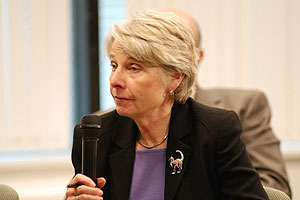
ELEANOR CLIFT, NEWSWEEK: The intervention of the Republican Congress and the president in the Terri Schiavo case, was that heroic conservatism or was that political pandering?
GERSON: I have a genuine deep concern that we are moving in the realm of bioethics and medical ethics towards eugenics in this country.
We have a situation where there are very few Down syndrome children born anymore because of genetic screening. I honestly don’t want to get into a circumstance where we weaken legal protections for the severely mentally handicapped. Now, there’s obviously a huge debate over when life-sustaining care should be withdrawn. And those are not easy medical questions. But to say that there’s no element of law in these things is a very dangerous thing.
[to]
GERSON: I guess the advantage I have of not speaking for the administration is I can say I’m just not sure; I honestly don’t know. I think, as a general principle, that you don’t make the most difficult medical ethical decisions in retrospect, that this was a case where I think at least some of the testing afterward indicated she had very little brain activity. If you knew that beforehand, in a decisive way-
DIONNE: But that is what the evidence showed beforehand. I say this as somebody who is opposed to doctor-assisted suicide, and I thought it was a disaster to make the Schiavo case the centerpiece of this. I could not understand the thinking of the right-to-life movement in this case, put aside the other point of view in this case, because the evidence was pretty overwhelming.
GERSON: But as I understand it, there were disputes about the evidence.
CROMARTIE: Yes, that’s right, a lot of disputes.
GERSON: So it really would depend. I think that people who have lost higher brain functions are not alive. I think that’s a fact you have to deal with, and it’s sometimes very, very difficult. I also believe in a natural death. I think that’s a very religious concept, that extraordinary care in cases where someone has no chance of recovery is not a moral requirement. But I think it’s a genuine legal question if you have a dispute within a family about whether someone is alive or not, and if there is evidence on both sides. I’m not just not sure there was. I don’t know the status of the evidence well enough.
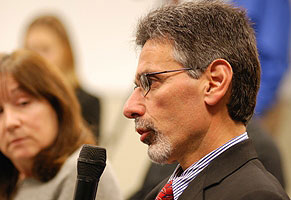
MARC GUNTHER, FORTUNE: You spoke earlier about the application of free-market or conservative means to achieve ends of social justice. On the domestic side, can you give me a concrete example or two of what that would mean around an issue like climate change or urban poverty or access to healthcare?
GERSON: I was an advocate of two things on climate when I was at the White House, one of them more strongly. One of them is to move away from the current CAFE system and have a “feebate” system that would encourage fuel efficiency within categories of automobiles, so that if you bought a gas guzzler within a light truck category, you’d pay a tax. And if you bought a car that got good gas mileage within that category, you’d get a rebate. They would be equal financially.
CROMARTIE: And what if you bike to work?
GERSON: I don’t know.
DIONNE: It’s good to hear you endorse tax and spend.
GERSON: Well, it is, but that’s a good market-oriented solution to something like this, because then your average moves up over time, because you’re encouraging people to purchase above the average. You don’t get it with these command-and-control systems. If you’re going to be serious about these questions, you have to deal with gasoline consumption, and you have to deal with electricity production. I support a cap-and-trade system on this, and for the best free market reasons, because right now, the production of carbon is a free good. You can pay any cost for it. The eventual solution for this is not going to be a command-and-control solution; it’s going to be a technological solution. We’re going to have a technological way to produce electricity from coal while preventing the emissions of carbon.
But right now, there’s no financial incentive to produce that technology. So a cap-and-trade system would essentially create a financial incentive for the production of new technology. The good thing about that is, even though reductions in American production on these things would have almost no influence on global warming, the technology then could be used by the Chinese and the Indians and the Mexicans. This is why these kind of technological innovations we contribute have a value in the world market. That seems to me to be a pretty good example.
I’ve supported efforts with asset-based welfare reforms within the White House-We still have problems in differentials in wages between whites and minorities in America, but they’ve closed over time. The huge disparity in America that we have is on wealth. I have the figures in the book, I don’t remember them exactly, but I think the average white family has something like $140,000 in wealth; average African-American family, 20 or $30,000 in wealth, which puts them in a much more fragile economic situation. If you have a downturn or lose a job, you can really lose everything.
I promoted the idea of starting accounts at birth that would be subsidized for low-income people in America that would use the miracle of compound interest to try to-
DIONNE: The Hillary Clinton idea.
GERSON: Yeah, I like-well, I can’t help it. (Laughter.) She took after me.
DIONNE: “Gerson endorses Clinton; praises Europeans in dealing-and endorses taxes.”
GERSON: Actually it was a Tony Blair idea, this “kids save” idea. I view that as a conservative idea to build wealth, independence, encourage dignity, just like we encourage homeownership, which is a good thing, and just like we should do more to encourage savings through individual development accounts and a variety of these other things. I don’t think these things are hopeless. I think there are actually some interesting ideas out there about how you can achieve ends of social justice through means that are not centralized and bureaucratic.
CROMARTIE: E.J., I’m told we have four minutes.
DIONNE: There are a bunch of good questions here. Let me give you all three, and you can deal with them-I suppose evade the ones-Now, somebody help me, because I don’t want to mispronounce this person’s name, Jason Byassee?
CROMARTIE: From the Christian Century, yes.
DIONNE: This was a question dear to my heart: “Reinhold Niebuhr taught, based on St. Augustine, that Christians ought to be the first people to suspect their own motivation, even or especially when they think they’re at their best. How can we be sure our very good motives don’t blind us to unintended consequences born of our own hubris?” That’s a superb-
GERSON: Let me answer it, because I think it’s important.
CROMARTIE: That’s a very important question.
[In]
But when it comes to the strategies and applications of ideals, there should be a humility in that. I think we need to-maybe some of that might have been more useful on Iraq, in considering some of the outcomes and problems, even when you had good motivations. But let me give you the flip side. My experience after Katrina, which revealed people who had never had a bank account, who had no connection to the mainstream economy of any kind-We had Republicans that were just interested in cost offsets, and Democrats who were just interested in the apportionment of blame. You had very little confrontation of this basic issue, this durable American issue, of race and poverty. The problem there wasn’t too much conviction in our system. It wasn’t too much idealism that, “We’re going to deal with these problems.” It was actually a deep-rooted indifference to these questions. So it really depends in a lot of ways.
In the letter from the Birmingham jail, Martin Luther King talks about being an extremist for truth. And I think sometimes that has to happen.
CROMARTIE: E.J., we’re out of time.
DIONNE: There are two Christianity Today questions you might send online, because we’re supposed to cut it off. But we should not ignore our friends at Christianity Today, and you wouldn’t want to.
GERSON: No, not at all.
CROMARTIE: We’ll be sure you get a copy. Ladies and gentlemen, could we just close by me saying-here is a copy of the book, for those of you watching online-it’s called Heroic Conservatism. We’ll do like Book TV and hold the book up to the camera. And of course, all of us are grateful for Michael taking the time out of his busy book tour and schedule to come over several blocks to be with us here at the Pew Forum. (Laughter.)
GERSON: Thank you, E.J. I appreciate it. Thank you, Michael.
This written transcript has been edited for clarity, spelling and grammar by Andrea Useem.
Please note corrections to the following factual inaccuracies in the written transcript, video and audio:
- The question asking for current examples of conservatives who are practicing “heroic conservatism” came from blogger Terry Mattingly from GetReligion.org, which was misidentified as GetReligion.com.
- In response to the question on whether heroic conservatism could increase anti-Americanism around the world, data from a Pew Global Attitudes Project survey was misstated. The survey actually showed that eight out of the top 10 countries with favorable views of America are in Africa.







